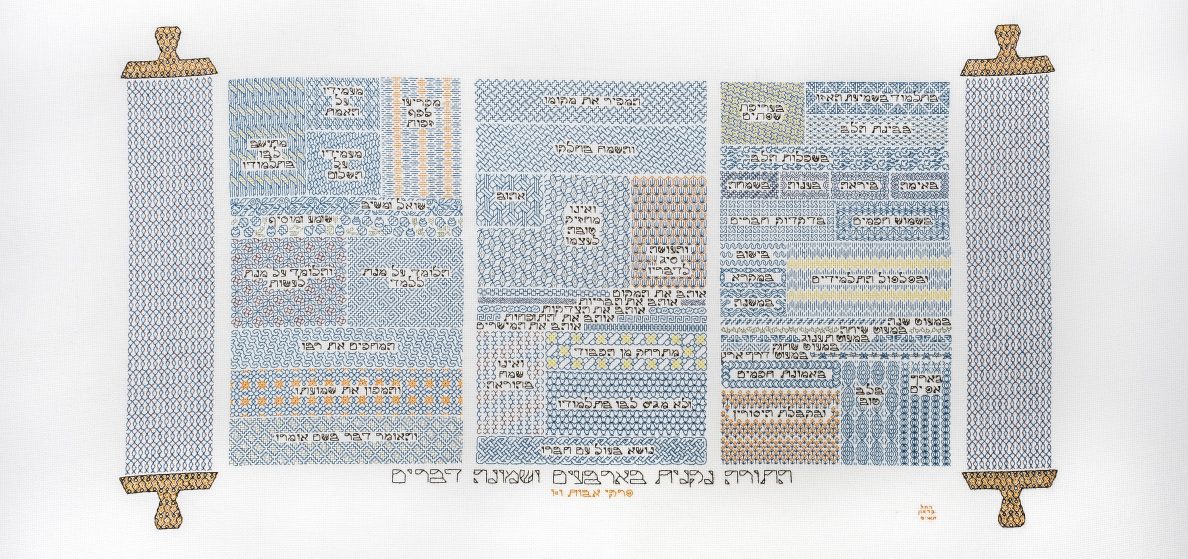In Chapter 42 of Genesis, the brothers travel to Egypt, seeking to buy grain as the famine persists. They encounter Joseph, now vizier of Egypt, but do not recognize him. He accuses them of being spies and demands that they return to Egypt with their younger brother Benjamin in tow. The brothers come to surmise, each in turn, that they are being punished for having abandoned Joseph in the pit. Here is the text of Genesis 42:21, along with Everett Fox’s translation:
| But they said, each one to his brother:Truly, we are guilty: concerning our brother! —that we saw his heart’s distress when he pleaded with us, and we did not listen. | וַיֹּאמְר֞וּ אִ֣ישׁ אֶל־אָחִ֗יו אֲבָל֮ אֲשֵׁמִ֣ים ׀ אֲנַ֘חְנוּ֮ עַל־אָחִ֒ינוּ֒ אֲשֶׁ֨ר רָאִ֜ינוּ צָרַ֥ת נַפְשׁ֛וֹ בְּהִתְחַֽנְנ֥וֹ אֵלֵ֖ינוּ וְלֹ֣א שָׁמָ֑עְנוּ עַל־כֵּן֙ בָּ֣אָה אֵלֵ֔ינוּ הַצָּרָ֖ה הַזֹּֽאת׃ |
The three words, אֲבָל֮ אֲשֵׁמִ֣ים ׀ אֲנַ֘חְנוּ֮ , “truly, we are guilty” are powerful indicators of the brothers’ states of mind. Of special interest is the word aval. It means “but” in modern Hebrew, but in the two instances it appears in Torah (here and when Abraham is told that Sarah will bear a son, Genesis 17:19), it implies “truly” or “verily”.
I am not the first to notice the similarity between the brothers’ exclamation (aval anahnu asheimim) and the three words introducing the short confessional in the Yom Kippur liturgy: aval anahnu hatanu – “indeed, we have sinned”. (For further discussion of aval, I commend to you the essay by Rabbi Eli Kaunfer in We Have Sinned , Rabbi Lawrence Hoffman, editor.)
Here is the text of the paragraph from the Yom Kippur mahzor that ends “aval anahnu hatanu” (emphasized in bold):
| Our God and God of our fathers, let our prayer come before you and do not ignore our supplication. For we are not so brazen-faced and stiff-necked to say to you, Adonoy, our God, and God of our fathers, “We are righteous and have not sinned.” But, indeed, we have sinned. | אֱלֹהֵֽינוּ וֵאלֹהֵי אֲבוֹתֵֽינוּ תָּבֹא לְפָנֶֽיךָ תְּפִלָּתֵֽנוּ, וְאַל תִּתְעַלַּם מִתְּחִנָּתֵֽנוּ שֶׁאֵין אֲנַֽחְנוּ עַזֵּי פָנִים וּקְשֵׁי עֹֽרֶף לוֹמַר לְפָנֶֽיךָ יְהֹוָה אֱלֹהֵֽינוּ וֵאלֹהֵי אֲבוֹתֵֽינוּ צַדִּיקִים אֲנַֽחְנוּ וְלֹא חָטָֽאנוּ אֲבָל אֲנַֽחְנוּ חָטָֽאנוּ: |
Following this paragraph in the liturgy, the alphabetical listing of sins commences, starting with ashamnu, with the same root as Joseph’s brothers’ word choice: asheimim.
| We have trespassed; We have betrayed ; We have stolen… | …אָשַֽׁמְנוּ. בָּגַֽדְנוּ. גָּזַֽלְנוּ |
The power of these simple words: “indeed, we have sinned/trespassed” is described in Talmud Tractate Yoma, where Mar Zuta maintains that this three-word sequence is all that is required for full confession:
| Mar Zutra said: We said only that one must follow all these versions (of confessionals) when he did not say the words: But we have sinned. However, if he said the words: But we have sinned, he need not say anything further because that is the essential part of the confession. (Yoma 87b:7) | אָמַר מָר זוּטְרָא: לָא אֲמַרַן, אֶלָּא דְּלָא אָמַר: ״אֲבָל אֲנַחְנוּ חָטָאנוּ״, אֲבָל אָמַר: ״אֲבָל אֲנַחְנוּ חָטָאנוּ״ — תּוּ לָא צְרִיךְ. |
What is the significance of aval? Whether it means “truly/verily” or, more recently, “but/nevertheless”, it provides the critical contrast between “we” and “sinned”. As when Abraham is told that Sarah will, indeed, bear a son, its use contrasts a perception and a reality. In the liturgy, aval suggests a dissonance between the self-conception and the lived experience of its reciter, who, the text tells us, is tempted to claim “we are righteous and have not sinned”.
Aval! Even if the reciter is incorrect, that self-perception of goodness is fundamental. Why would one repent if one hadn’t, foundationally, a sense of the desirability of being truly righteous, a recognition of one’s core goodness? Indeed, without that discernment, one might never embrace the reflection required to detect and expose one’s shortcomings.
So perhaps the brothers had, until that point, understood themselves to be good people. They appeared to be loyal sons who stuck close to their self-indulgent, often annoying father, Jacob. Reuven, though ineffective, imagined himself returning to the pit to rescue Joseph. Judah is able to acknowledge the correctness of Tamar’s actions in contrast to his own. Even Simeon, perhaps, thought he was defending his sister’s honor in his attack on Shekhem.
In Egypt, as the horror of Joseph’s threat unfolded, the brothers might have dissolved into the self-pity that their father Jacob modeled. Instead, they said “aval”. TRULY, they conceded, we can recognize that we had wronged Joseph. Whether intellectually or emotionally (here, likely the latter), they are able to contrast their existing self-image with a new concession to their failures. As Mar Zuta promised, from that confession emerges the opportunity for teshuva.
Is this a case of Solelveichik’s hirhur teshuva – the dawning or glimmering of teshuva? This would be a confession and change born of a murky sense that something is not right, or perhaps a sudden event (like Joseph’s threat to Benjamin) that provides clarity. It is a bit like the Hadrianic persecutor in the Yom Kippur Martyrology, who gained Heaven in a moment by pulling the smoldering wool from R. Hannanya ben Terodion, as he died by fire. It does not erase their past misdeeds, but gives a hint of redeeming core goodness.
Finally, let’s look again at the brothers’ exclamation: אֲבָל֮ אֲשֵׁמִ֣ים ׀ אֲנַ֘חְנוּ֮ , “truly, we are guilty”. In the Biblical passage, there is a vertical bar, called a paseq, the words asheimim (guilty) and anachnu (we). When chanting Torah, the paseq requires that the reader break the legato in her voice and offer a brief pause. Even our singing of these words reinforces the desire to separate ourselves from our misdeeds.

